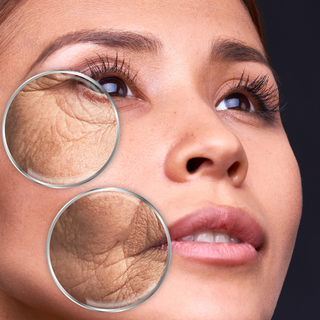There are a number of things that make up your self-image and fuel your confidence. There's no set formula to feeling good in your own skin and while some are born with go-to confidence, for others it's a challenge.
Skin pertains to more than beauty; it pertains to psychology as well. How we view ourselves depends mainly on our own internal representations, and a good majority of those come from our physical appearance.
What is Confidence?
By textbook definition, confidence is: "a belief in oneself, the conviction that one has the ability to meet life's challenges and to succeed—and the willingness to act accordingly." - Psychology Today
Why does confidence matter? Why is confidence important? Confidence allows us to tackle life's experiences with a positive state of mind that we can overcome obstacles and that we're secure in our capabilities and our worth.
But when our confidence is compromised, we run the risk of developing skin conditions that oftentimes can become a vicious cycle. Sometimes it's the skin conditions in the first place that strike down the confidence. But can emotions really affect skin on a physical level like this?
What Are Psychophysiological Disorders?
Psychophysiological disorders are defined as diseases of the body or skin caused by stress or made worse by stress. Skin diseases that fall into this category include psoriasis, atopic dermatitis, hyperhidrosis, and acne.
This means that yes, emotions can have a drastic influence on your skin. Stress, depression, anxiety - these are all mental states of being that can cause adverse skin reactions or even flare-ups, which have been reported in recent surveys and studies.
How Does Stress Affect the Skin?
Fun fact, when stressed, the body tends to react by releasing specific hormones into your system. These hormones include cortisol and adrenaline, which lead to increased oil production in your skin, leading to possible clogged pores and breakouts.
Have you ever noticed that your acne has flared up with no real root cause or reason? Stress has the potential of causing more than just breakouts. These hormones are capable of aggravating psoriasis, rosacea, and eczema.
Cortisol and Aging
Not to mention, cortisol's effects on the skin reach farther than just a bit of aggravation and flare-ups. Cortisol in the body has a tendency to break down collagen and elastin in the skin, leading to premature aging and weakened skin cells. This means a breeding ground for wrinkles, fine lines, and sagging skin.
The Brain-Skin Connection
There exists something called psychodermatology, or the blend of psychiatry and dermatology. The idea that the skin is a "thinking" organ has been the fascination of many scientists and dermatologists and has even been studied.
Except that studies have shown statistical proof that emotions such as stress, depression, and anxiety have a real-time effect on skin. There's also a correlation to those with other conditions, such as bi-polar disorder and anxiety spectrum disorders, that are frequently found in patients with skin conditions.
Need more proof? It's also been documented that "serotonin acts as a mediator between the skin and the neuroendocrine system. Serotonin also contributes to the effects of psychological stress on the disruption of skin homeostasis and stress has been deemed an aggregator of psoriasis." (Martins A M, Ascenso A, Ribeiro HM, et al. The brain—skin connection and the pathogenesis of psoriasis: A review with a focus on the serotonergic system.)
Also, according to the National Library of Medicine: "Stress conditions exert their effects to skin mainly through the hypothalamic-pituitary-adrenal (HPA) axis. Upon sensing stress, neurons in the hypothalamus secrete corticotropin-releasing hormone (CRH), which is transported to the pituitary gland, where it binds to the CRH receptor type-1 (CRH-R1) and stimulates the secretion of proopiome-lanocortin (POMC)-derived neuropeptides, including α-melanocyte stimulating hormone (α-MSH), β-endorphin, and adrenocorticotropin (ACTH). In turn, ACTH travels to the outer layer of adrenal cortex through the bloodstream, binds to the MC2 receptors (MC2-R), and stimulates production of glucocorticoids (GC) including cortisol and corticosterone. Cortisol is the primary stress hormone in human that regulates a wide range of stress responses [14]. Cortisol works by binding to the glucocorticoids receptor (GR), which undergoes conformation change, dissociates from the heat shock protein binding complex, translocates to the nucleus, and affects gene expression through binding domains on gene promoter regions or direct interactions with transcription factors like Activating Protein 1 (AP-1) and nuclear factor-κB (NF-κB) [15, 16].
Long story short, stress is felt within the skin and puts into motion a domino effect of chemical reactions that can have adverse skin effects.
Confident Skin, Confident You
Taking care of your skin means more than just slathering on some serums and creams and using a dermaroller. If this article has shown anything, it's that your mental well-being plays a vital role in the health of your skin and body. Stress affects not just the skin, but psychological wellness. And it just goes to show the power your mind has over your body.
Which is why it's important to take care of your mental health just as much as you take care of your body. It's been proven that heavy emotions, stress, and anxiety lead to chemical chain reactions that can be detrimental to your skin, causing breakouts, flare ups, rashes, and even aging. Pay attention to your stress levels, incorporate self-care, meditate, get a massage, reduce stress-inducing elements in your life, and take care of your emotional space. You only have one skin, but you also only have one mind. Take good care of it!
Thank you Amber Babies for tuning into yet another blog post! Feel free to leave comments and questions and don't forget to visit me on TikTok, as well as on IG, @ginamberx, where I go over remarkably effective skincare tips, trends, and topics!

Gin Amber
@Kim You’re welcome, love! Never forget to unwind from time to time 🤗
Kim Falconer
Very true…i break out at 55 when stressed but have always wondered why and now I know…thank you xx